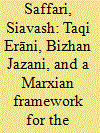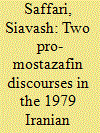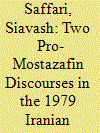| Srl | Item |
| 1 |
ID:
180021


|
|
|
|
|
| Summary/Abstract |
This article examines the development of a Marxian frame for the critique of religion in twentieth century Iranian political thought by Taqi Erāni and Bizhan Jazani. It argues that, following Marx, Erāni and Jazani understand religion to be a superstructural relic from an earlier stage of human development which will gradually and inevitably withdraw from collective human life as a consequence of the material dialectics of history. It further shows that Erāni and Jazani consider religion to be instrumental in sustaining relations of oppression, and they view with skepticism attempts to reform religion or to use religious faith as an instrument for mass mobilization in revolutionary struggles.
|
|
|
|
|
|
|
|
|
|
|
|
|
|
|
|
| 2 |
ID:
153279


|
|
|
|
|
| Summary/Abstract |
A number of studies have examined the role of the economically marginalized classes in the 1979 Iranian Revolution and the events which transpired in its immediate aftermath. It has been suggested that the mass mobilization of these classes, often referred to collectively as the mostazafin (downtrodden) in the official literature of the Islamic Republic, was instrumental in the success of the revolution and the subsequent establishment of the Islamic Republic under the leadership of Ruhollah Khomeini. The present paper contrasts Shi’i liberation theology and Shi’i Islamism as two distinct pro-mostazafin discourses that emerged in mid- and late-twentieth century Iran, and which facilitated the participation of the lower- and under-classes in the revolutionary movement. It argues that while it was developed originally by Shi’i liberation theologians, Islamist forces were able to successfully appropriate the pro-mostazafin discourse and gain the support of the economically marginalized classes in the crucial final phase of the revolution, and in doing so create an important social base for their political power.
|
|
|
|
|
|
|
|
|
|
|
|
|
|
|
|
| 3 |
ID:
154693


|
|
|
|
|
| Summary/Abstract |
A number of studies have examined the role of the economically marginalized classes in the 1979 Iranian Revolution and the events which transpired in its immediate aftermath. It has been suggested that the mass mobilization of these classes, often referred to collectively as the mostazafin (downtrodden) in the official literature of the Islamic Republic, was instrumental in the success of the revolution and the subsequent establishment of the Islamic Republic under the leadership of Ruhollah Khomeini. The present paper contrasts Shi’i liberation theology and Shi’i Islamism as two distinct pro-mostazafin discourses that emerged in mid- and late-twentieth century Iran, and which facilitated the participation of the lower- and under-classes in the revolutionary movement. It argues that while it was developed originally by Shi’i liberation theologians, Islamist forces were able to successfully appropriate the pro-mostazafin discourse and gain the support of the economically marginalized classes in the crucial final phase of the revolution, and in doing so create an important social base for their political power.
|
|
|
|
|
|
|
|
|
|
|
|
|
|
|
|